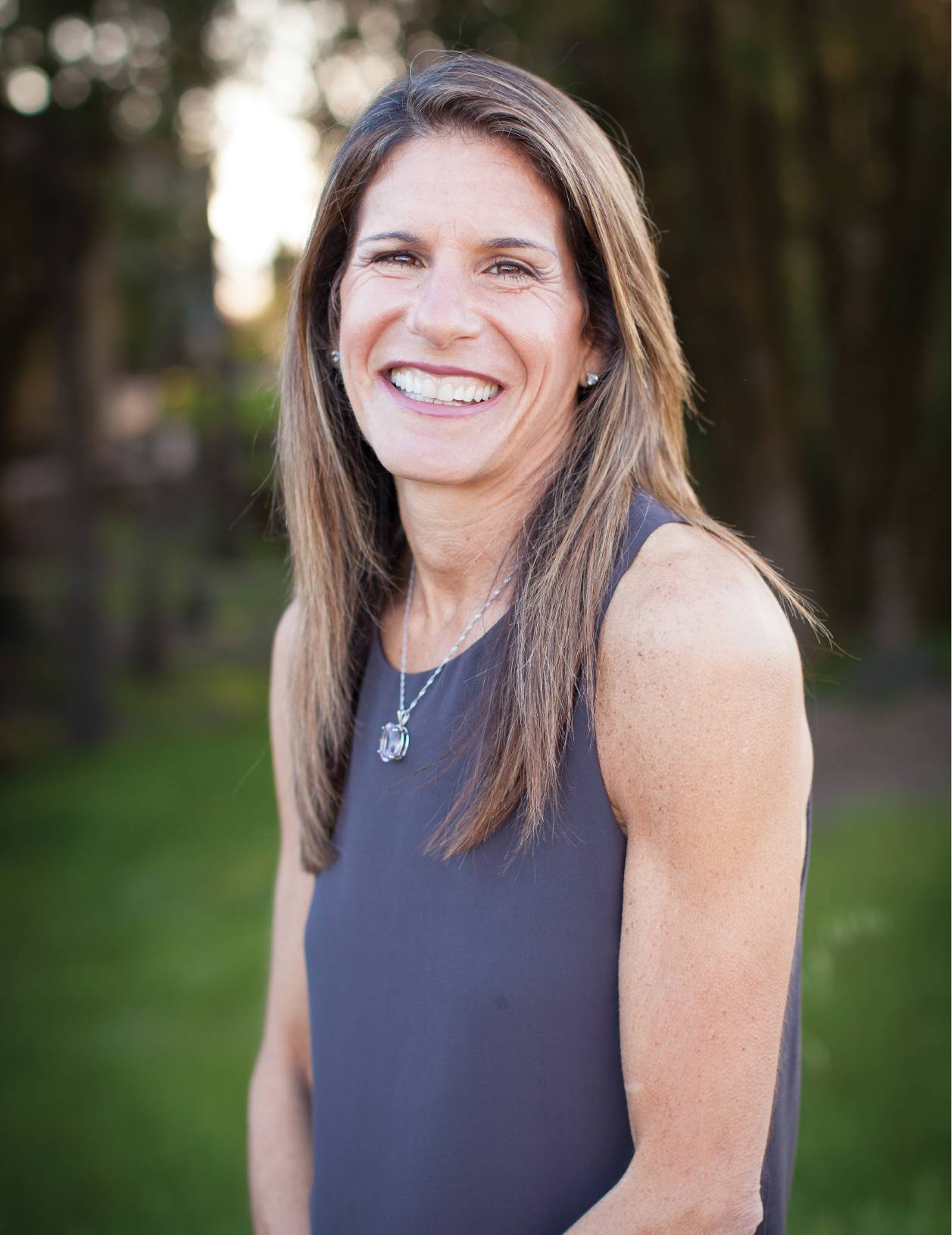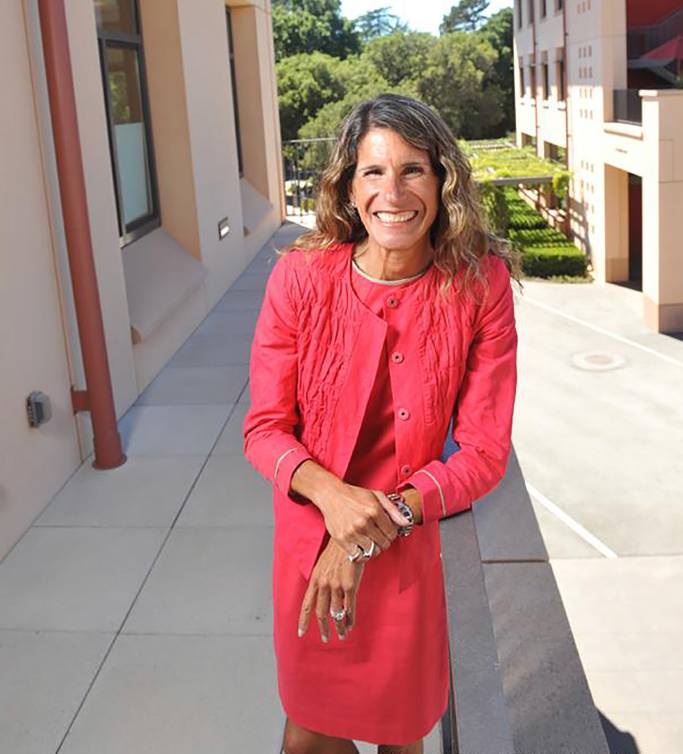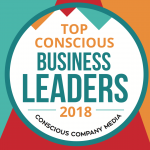In some ways, Sheryl O’Loughlin is the classic social entrepreneurship hero. Her resume is beyond impressive: She was CEO of Clif Bar and Company where she helped launched the Luna bar, was co-founder and CEO of Plum Organics, spent several years as executive director of Stanford’s Center for Entrepreneurial Studies, and is now CEO and president of fast-growing functional beverage brand REBBL. Yet despite all her apparent triumphs, the demands of the high-pressure world of entrepreneurship had a terrifying dark side, as her need for control internalized into a serious eating disorder. She was only able to recognize and acknowledge the depth of her illness after she stepped away from the business world for a while — a break she thought would be permanent.
Now, in her new book, “Killing It: An Entrepreneur’s Guide to Keeping Your Head Without Losing Your Heart,” she shares an intimate chronicle of the most challenging period of her journey, a time when she and her family lost all their savings and more on one failed business even as she wrestled with the enormous challenges of getting her startup, Plum Organics, off the ground. More than a confessional tell-all, her book is a call to arms for entrepreneurs everywhere, a rousing plea to shed the harmful myths and illusions that leave so many entrepreneurs feeling isolated and broken. “The entrepreneurial world is a vibrant one, holding incredible promise and light,” she writes. “But at the same time, it has a dark side, too, just as the courageous people who populate that world do. The key is knowing how to keep the dark at bay while letting the light lead.”
We talked with O’Loughlin about why she wrote the book and what she thinks needs to change about the sometimes-toxic culture of entrepreneurship in order to allow a new, healthier definition of success.
InterviewTell us the story of how you decided to write this book.
Sheryl O’Loughlin: When I was teaching at Stanford, I saw all these students — young entrepreneurs, some of the brightest people out there — with stars in their eyes. But the reality is that 99 percent of businesses fail. What I began to realize is they’re not seeing the dark side. There’s so much money there, right in the middle of Silicon Valley. There are investors walking the halls every day, billionaires walking into the dorms, billionaires teaching classes. The media likes to talk about the success stories. What you don’t hear are the ramifications when things go wrong. And you don’t even hear the ramifications when things go right, as they did with me, by the traditional “success” letter of the law. But there’s a lot of backstory behind that, and I wanted to get that story out to entrepreneurs all over the world.
In my day, it was consulting that everyone went into. Now it’s entrepreneurship. This story has got to get out. People have got to understand, women and men, that there is a lot of dark behind the light, and I want them to understand so they can hopefully follow a different path, or at least be conscious of the path as they’re going through it.
I think about this like a pregnancy book. There’s no way somebody can describe to you exactly what it’s like being pregnant and having a child. But pregnancy books are so needed, because they help prepare you to know what’s potentially coming. They let you say, “I’ve heard this before. This is not something that’s wrong with me. This is what every woman goes through.”
You talk about “shifting the cultural norms of entrepreneurship.” What does that mean?
SO: I want us to support each other as a tribe of entrepreneurs, to be able to share what we’re going through and know how important that tribe is, right from the beginning. Not after the fact, not when we’re in recovery from being entrepreneurs, but before the fact. The funny, dirty little secret in the background is that among everyone who’s been through entrepreneurship, there’s this talk like, “Oh, I went through that.” “Oh, I went through that, too.” We call ourselves Recovering Entrepreneurs, because we’re able to reveal to each other, after the fact, what the dirty little secrets are.
Granted, you can’t tell your struggles to everybody, but my God, there’s a huge tribe of entrepreneurs; we can tell them to each other. The great tribe test is, can you cry in front of these people? I want entrepreneurs knowing that it’s okay to cry and that we need that kind of support. That support makes us stronger, not weaker. It makes us stronger as entrepreneurs, stronger as CEOs for our companies.

CEO and entrepreneur Sheryl O’Loughlin suffered from an eating disorder in part due to the pressures of startup culture.
“We forget that it’s biology. It’s not a machine, it’s people. It’s human. We need to bring humanity to entrepreneurship.”
Taking it one step further, I want investors and boards knowing this is not something you have to fear. You should walk in and say, “One of the first things we need to help our entrepreneurs with is getting them a third-party person they can talk to — like a business therapist — who can help them through the hard times. It’s not a frivolous spend. It’s an essential spend for the strength of our company.”
We talk about how essential it is to the survival of our companies for our entrepreneurs to be thriving, yet we do exactly the opposite of helping them thrive. We berate them. We say that it’s all about making the money. We push them to the point that they absolutely have nothing left in them. We push the companies to the point that they’re breaking before we put enough money into them to hire people, because we want to keep costs down. It’s ludicrous. We do everything the opposite of what companies need to do to thrive. Yeah, I want to change the goddamn culture around it. It is not healthy.
What would it be like if companies had this kind of philosophy going in? It doesn’t say, “Be frivolous with our money.” That is not what we’re saying. I couldn’t be more conscious of how important cash is. I’ve started companies, I’ve run companies, I know how important it is. But that doesn’t mean that you take everything away from the living, breathing people and biology of this organization that’s being started. We forget that it’s biology. It’s not a machine, it’s people. It’s human. We need to bring humanity to entrepreneurship.
Why was telling your own story about your eating disorder important, and was that a difficult choice to make?
SO: It wasn’t a difficult choice. It’s hard knowing that I’m going to welcome people judging it and judging me because of it. But my point is not the eating disorder itself. The demons could be divorce. The demons could be drug addiction. The demons could be depression. The demon has been suicide for many people. I knew that I needed to share my own demon to help people be able to recognize potential demons in themselves. The point is to watch for the demons.
In the book, I talk about Dr. Michael Freeman, who’s done this groundbreaking study, “Are Entrepreneurs Touched with Fire?,” where he’s the first to find that there’s a correlation between entrepreneurship and things like ADHD, depression, drug abuse.
Entrepreneurs — we’re bull-headed. We’ll push through anything to make things happen. But we get so focused that it could be at the expense of life itself. The thing that pushes us a lot of times to be great — the other end of the spectrum is that dark side that can so easily come out if we’re not really conscious of what we’re going through in the ride. It’s this combination of genetics, put together with personality, put together with an extreme situation that causes the explosion to the dark side. Entrepreneurship in and of itself, with the extreme ups and downs that happen on a day-to-day basis, and all the people who are counting on you to make it a success, is the perfect place for that explosion to happen. The culture has to change to make it so that explosion doesn’t happen.
What scared you the most about this project?
SO: When I started writing this book, I had not found REBBL yet. I had moved up to Santa Rosa, in wine country, and I was going to teach entrepreneurship at Sonoma State and just work on boards of companies. I was done with the day-to-day. When I started writing this book, I wasn’t running a company, and so there was a low fear about it.
But I discovered REBBL. I started to take over as CEO, having the time of my life because now I know how to do this right, especially being in the right headspace for it, not having my self-worth wrapped up in it. I was fundraising, and as I started taking on investors, I started thinking about the day that I would have to tell them about the content of this book. That day just came two weeks ago.
I still had some fear, like “What are they going to think knowing this about the CEO running their company?” I’m recovered, but still, it’s part of my story. Would that scare them?
It didn’t scare one of them. It just reinforced to me how incredible my board and my investors are. In fact, they said, “Listen, Sheryl. We all are here knowing we’re building a very different kind of company, and these are stories that happened and we support this kind of story coming out. We think it’s really important. Other entrepreneurs need to know about it, and again, this is all part of our story of building a different kind of company together.”
Mark Rampolla — who founded ZICO Coconut Water and runs the fund Powerplant that was the lead investor in our last round — said to me, “I don’t care if for some reason this causes our return on investment to be a little bit less. This story is a real story, it’s important, and we’re doing something different with this company. We said if we have a commitment to doing better for the world, who knows what that’s going to mean in the long run, but this is our commitment. It’s all part of our story.” That’s the response I got on this. But it scared the bejesus out of me when I was getting on the phone to tell them.

O’Loughlin near her lowest weight. Photo: San Francisco Business Times
What are the most harmful norms or myths that you’ve seen in the entrepreneurial community that you would love to banish?
SO: As entrepreneurs, we’re constantly selling. We’re selling investors on this vision of something that doesn’t exist. We’re selling our employees to come work for our companies when we have virtually nothing to pay them. In the food and beverage world, we’re selling co-packers to manufacture our products when it’s not worth their time at all to do so because our runs are so small.
We sell a dream. That’s an important part of what we do. But the myth that comes along with it is that entrepreneurs are all this masculine energy of, “We will make anything happen. Nothing goes wrong. Everything is perfect.” We can’t let anyone see a crack. That’s impossible. That’s inhuman, and we’re human beings. Under the surface, there are cracks. I want to blow that hard exterior away, to the extent that we can have some realness in this world.
I’m not condoning that you go out and you tell everyone, “Here’s everything that’s going wrong with me. Wow, I don’t even know if this shit’s going to work. I have no idea!” We do need to sell. You’ve got to believe in yourself. No one’s going to believe in you if you don’t believe in yourself as the visionary of the company. But there needs to be another way to support each other and we need to support the emotional, physical, and mental health of our entrepreneurs through the process. It’s about finding a way to bring that support on the back end, knowing that we’re dealing with humanity.
By the way, for us as entrepreneurs, growing a business is knowing that our people are experiencing an extreme amount of pressure every day, too, and they need our support. One of the biggest things I talk about in my company now, REBBL, is help. The word “help” is seen as a scary word; it’s seen as a sign of weakness. I want to get rid of the weakness around that word.
“Help” is the most powerful, empowering word we have.
I say to my teams, “When you need help, you better tell us you need help. And we’re going to honor that and everyone will step in to help you.” The problem is when you don’t say you need help, and then there are huge ramifications for you and the company.

O’Loughlin with her husband, Patrick, and her sons Connor and Gavin
What do you think is better or worse about these challenges and mental health issues in the social entrepreneur community, as opposed to the entrepreneur community at large? Is it better or worse for people on a mission, from what you’ve seen?
SO: Wow, that’s a very interesting question. There are goods and bads. Mission-based companies like attract people that are a little bit more emotionally and spiritually connected, because we believe so much in the purpose behind what we’re doing. I don’t have any scientific evidence behind this, but I think there’s probably more ability to open up and connect with each other, and, especially as we’re starting the companies from the ground up, more of the ability to build it in from the start.
At REBBL, we were started by a nonprofit, Not For Sale, to fight human trafficking. I’ve been so attracted to this company and so passionate about it, it’s almost as if I started it, because it’s been so steeped in that from the beginning.
REBBL is such an essential part of this story because of the joy that it’s giving me, in terms of realizing again how there can be a better model for creating the foundation of a company out of pure purpose, how there can be a better way to have investors in your company, how there can be better ways to run a company with employees that really believe in the meaning behind their work, where we honor each other and help each other, and we can still create a killer company in terms of the growth we’re experiencing right now, but doing it in a way that doesn’t at all walk away from our principles.
It’s a story that now is ending in terms of really understanding what it means to have found my self-worth and still building a freaking amazing company. Not just in spite of it, but because of it.
The hard thing is that there are probably still a lot of skeptical people who would say these mission-based philosophies are not generating strong businesses. Obviously, we’re starting to prove that wrong, with more and more companies doing exceptionally well in any kind of bottom line you look at — some of the highest performing companies out there. But there’s still skepticism, and there are investors who might be going into these kinds of businesses because they see the financial results but aren’t really willing to understand what it takes to be with an emotionally and spiritually connected company.
What about employees in the startup? A lot of your message is, very rightly, towards founders and entrepreneurs who have the whole weight on their shoulders, but what would you say the rest of the small team can do, for example, if they’re worried about their founder?
SO: What’s important is to be able to sit down with the founder and — this is really hard — say, “I’m worried about you. Here’s the evidence I have which is making me worried about you. How can I help?” Even if your founder can’t hear it, hopefully if more people are willing to come forward, they’re going to hear it over time. It probably took seven people to tell me that I had anorexia for me to accept it, but it did sink in.
If the founder is completely falling apart, at the end of the day you owe it to the company to tell someone else, maybe a board member that you trust, somebody who’s going to be able to help make the message clear. Everybody goes down if the founder goes down. And the founder could lose everything. In some ways, you need to take a long-term perspective going in. But it’s hard.
One other thing: I start conversations by trying to take someone’s defenses down by saying, “I want to share with you something that is very hard for me to share, and might be hard for you to hear. Do you give me permission to say something in a very transparent way?” Have the founder accept the responsibility that they have allowed it to come in. Then they’re mentally prepared that something is coming that they really need to hear.
What is the number one message you would love to get across to founders or potential founders and entrepreneurs?
SO: The company can’t be your self-worth. My self-worth was so wrapped up in Plum that I almost lost everything as a result. “Everything” being, if it went too far, my life. And it ain’t worth it. There are so many more things that are so important.
I want to rewrite the definition of success. I know it’s very hard for new entrepreneurs because you want to be all-in, and I agree that there’s an importance of being all-in. But, my God, understand who you are as a person, what’s important in your life.
If that company goes down — because 99 percent of them are going to; we all think we can beat the odds, but those are some pretty big odds against us — not to be negative. At the end of the day, you can come out the other side knowing that you’re still a very good person, and that your self-worth is about who you are and the gifts you bring to the world and the gifts in your life. It’s not about one company and one situation.
Hold on to your self-worth. And if you don’t have the self-worth to begin with, don’t start a company. Find your self-worth first, then start a company.
What’s giving you hope?
SO: About five months ago, I said to my two boys — they’re 16 and 13 — “Guys, do you think that woman entrepreneurs could be as strong leaders as men?” And they looked at me kind of stunned. They both said, “I don’t understand the question.” For them, now, there is no difference between women and men in terms of leadership. Both are just as capable. They have more women role models as leaders than men. That’s a beautiful thing. They don’t see all the barriers that we’ve seen.
So, finally, maybe we can move to a place where our companies have the true diversity that has been proven statistically . Especially when women are running companies or are part of a management team, the companies are more profitable as a result of it. We have results on this shit, excuse my language. Our kids now are actually believing that in their core. That gives me huge hope in terms of what this world could be like.
Wise Words
O’LOUGHLIN’S TOP THREE PIECES OF ADVICE FOR MISSION-DRIVEN ENTREPRENEURS
1 // Know your purpose and vision, and make the right choices to support them.
It’s so easy, when the money is out there, to just take the money when you desperately need it. I know how much pressure there is to do it, but the choices that you make in the beginning have a ripple effect in what happens with the company in the long run. Be very vigilant and conscious as to what the next steps are, especially in regards to money.
2 // But be willing to pivot.
As founders, sometimes we get so bull-headed on our vision that we don’t see that things in the environment are telling us that we need to adjust it. We think that the first vision is the vision. It’s important for entrepreneurs, especially in mission-driven companies, to listen to the signals, whether from our employees or from the market. What Steve Blank says so beautifully is that a startup is not a company; a startup is an experiment in order to find a sustainable, valuable business model. And so we need to remember in our startups, we’re just trying to find our proof of concept to make a company. Adjust your vision over time as you ebb and flow and learn, without walking away from your core principles and purpose.
3 // Be conscious of your role in building a culture right from day one.
As soon as you hire your first employee, you have an impact on culture. A lot of times as you’re in the beginning of a startup, you’re pushing so hard to make it happen, just to get a proof of concept, culture kind of goes by the wayside. But it can’t, because it’s happening whether or not you’re conscious of it.




